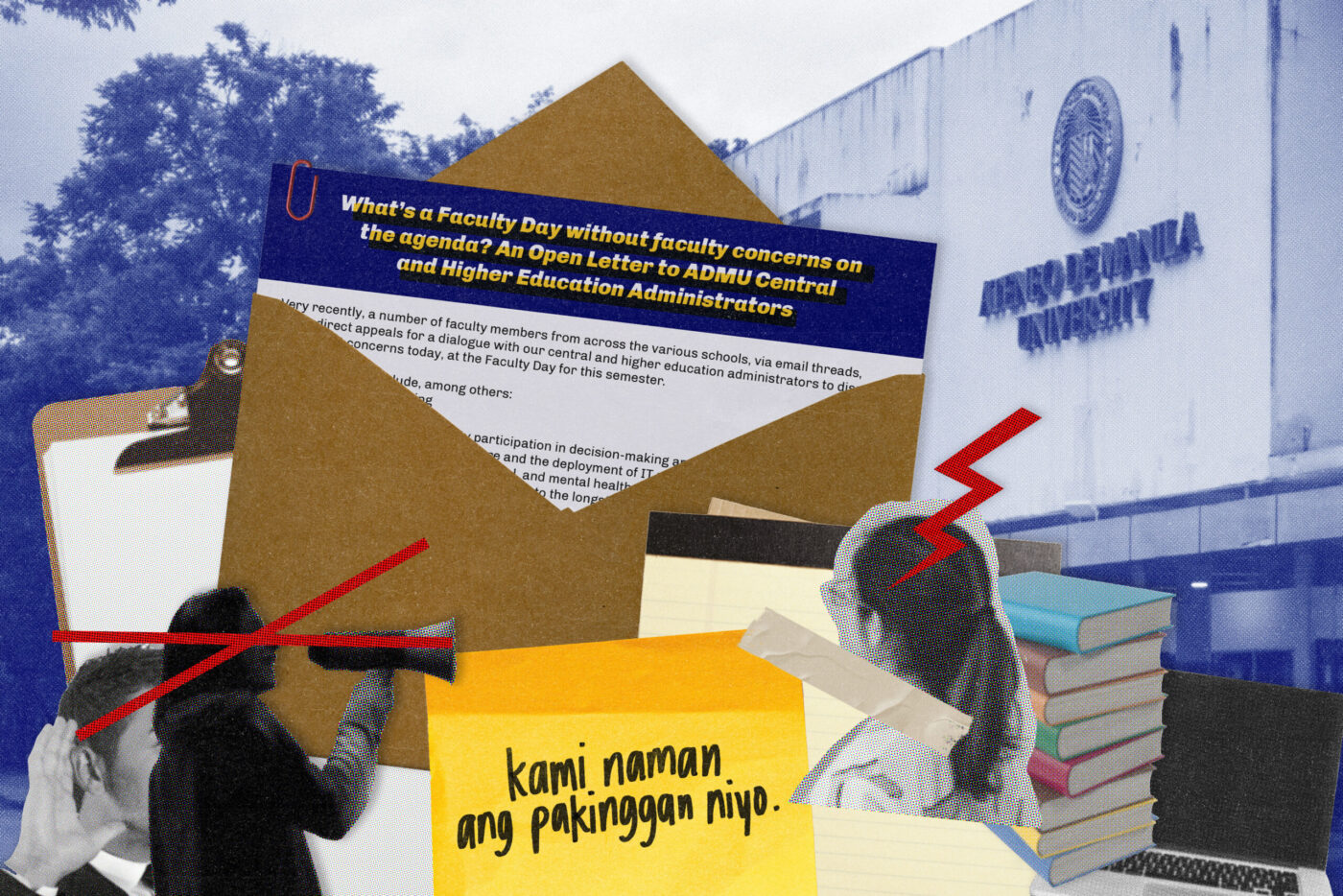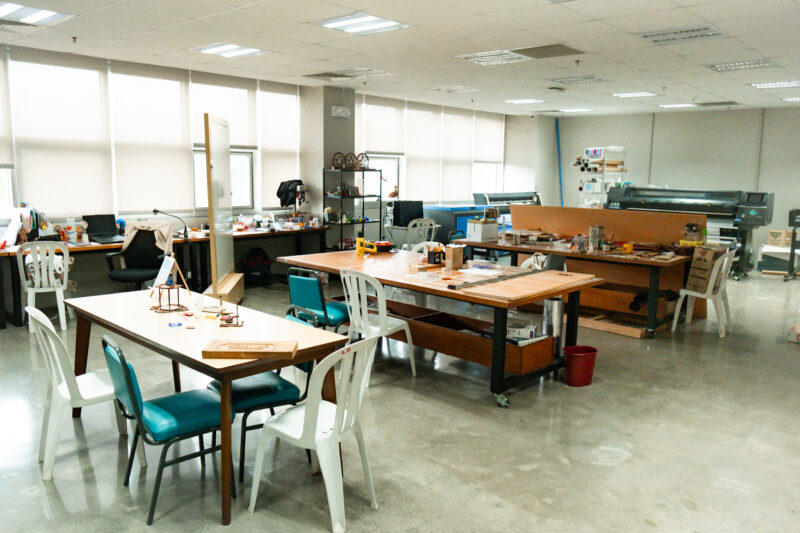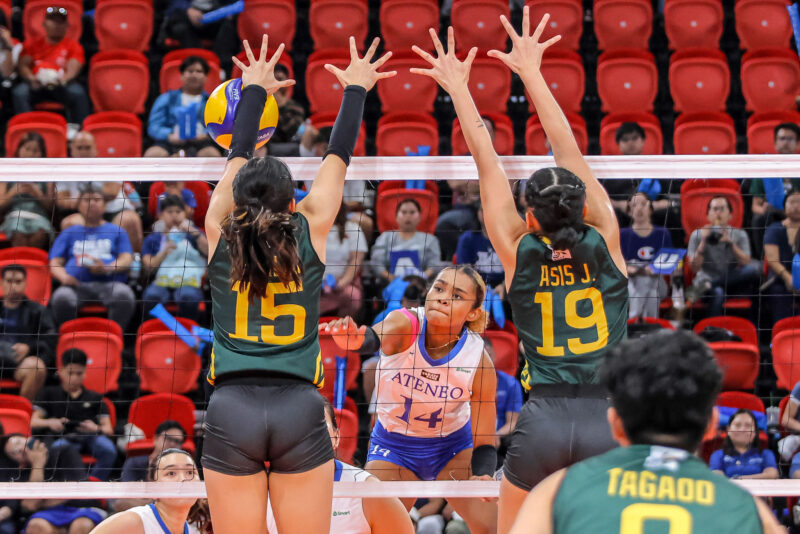MONTHS AFTER voicing their concerns to the Ateneo administration, the Higher Education Cluster (HEC) faculty continues to vie for conversations to address their concerns listed in an open letter released last August 25 as part of the HEC Faculty Day.
As of November 1, 316 faculty members have signed the letter, which detailed their personal grievances felt at large. Additionally, separate joint statements by SPARK-Katipunan and the Sanggunian have openly supported the letter and its aims.
Among the issues detailed were the lack of dialogue between the faculty and administration, the absence of avenues for faculty participation in decision-making and grievance resolution, and the lack of material and emotional support for the faculty.
Since then, Vice President for Human Resources Maria Cortez, PhD, mentioned that the administration held town halls last September 6 and October 3 to have conversations with the faculty.
“Our [initial] reaction [was] to look closely into the points raised in the letter in order to better understand their context and determine how best to address their concerns,” she said.
Overdue conversations
Contextualizing the letter, Political Science Assistant Professor Arjan Aguirre, MSc, said that the letter was a notice of the collective experience of the faculty. As one of its writers, Aguirre commented that these issues have been present even before the pandemic. However, he remarked that they at least had more avenues for participation and communication with the administration in the past.
As an example, Aguirre specifically called back to policy- and decision-making standing committees, which were partially composed of faculty members. Beyond the onset of the pandemic, Aguirre felt that the faculty seemed to no longer have influence in policy-making, as the one-way communication notably worsened.
“We’re not asking na lahat naman ng policies ico-consult sa amin, pero sana naman ang ibang policies na affected kami, i-consult mo kami. I-consult mo [ang] mga students,” he expressed.
(We’re not asking that all policies should be consulted with us, but hopefully they do consult us about policies where faculty or the students are affected.)
Expounding on the communication between the faculty and the administration, Former Vice President of the Loyola Schools (2010–2016) and Computer Science Professor John Paul Vergara, PhD, mentioned that the faculty is used to open communication and consultation.
Vergara further noted that the administration has seemingly leaned toward a more corporate style of leadership, which he thinks is conflicting with the academic setting. In recounting his experiences, he described this style to be firmer with choices, arguably leaving less room for academic freedom.
“It’s a matter of [a leadership] style where you achieve the balance, and if you start tipping towards one side, [then] that’s when tension happens,” Vergara said.
Lingering disconnect
Relating this style to current issues, Vergara observed that some major policies being set in place are contradictory to current setups of work. Making it his primary example, he thought that suddenly capping Google Storage was counterproductive to work and learning given that the faculty and students have been heavily reliant on it.
“[We] learned to use all these tools [and] after supporting us and telling us this is the way to go, suddenly you’re saying [we] can’t use as much space,” Vergara said. In particular, the shift of policy has led to Vergara’s deletion of many past lecture recordings and data, which date back to when he was an administrator.
Aguirre further added that the storage cap has already affected the University’s institutional memory because the faculty has had to remove much of their previous work. He noted that the administration saw the unlimited storage as a privilege when faculty saw it as naturally part of their work.
In addition to the storage caps, Aguirre expressed his grievances with campus security measures, believing that the practice of simply cordoning areas off is outdated and ineffective. He thinks that security work should be done by making the spaces more open and conducive to the community, relying on being each other’s watchdogs.
Seeing eye-to-eye
In response to the grievances, Cortez disclosed that solutions to concerns in the list have already been studied and approved, but have yet to be launched within the fiscal year.
Primary to these solutions are the salary adjustments, which were set to be launched in sync with the regular salary adjustments of employees. Likewise, Cortez revealed that the offices had been reviewing the protocols for the pandemic, campus access, and security concerns prior to the open letter.
Moving forward, Cortez reiterated that the Office of the Vice President for Higher Education’s town hall initiatives serve as “a venue for the members of the community to have public conversations.” Through this, the administration hopes that they are able to cover important problems stipulated in the open letter.
“The offices we manage can be approached by our employees anytime for concerns that they want [to be] addressed, or feedback they want to send to our offices about our services,” Cortez said.
Despite these town halls, Aguirre believes that the initiatives being undertaken do not provide an open environment for dialogue, citing the lack of faculty participation in the presentations. Regardless, he remains hopeful that the administration would be open to conversations.
“Talk to the faculty. The literal dialogue should be there. […] You organized [the town halls] to present your side, but how about our side? We must build trust,” he asserted.
Vergara echoed the same sentiments, hoping that the changes to come will be felt and welcomed by all. “[I hope] we can go back to being a community that feels like we’re helping each other as opposed to complaining about the admin,” he said.
As of November, the administration has since changed the 20 GB storage cap for teachers to 55 GB in their recent policy, giving exemptions for professors who request it. Additionally, they have also eased campus access, making it more accessible for visitors.







